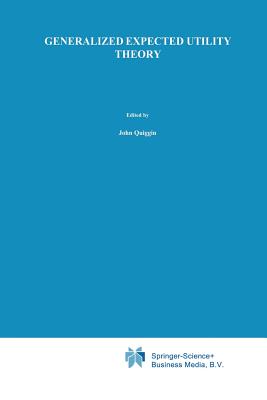

 Springer
Springer
Generalized Expected Utility Theory: The Rank-Dependent Model


Key Metrics
- John Quiggin
- Springer
- Paperback
- 9789401049665
- 9.21 X 6.14 X 0.47 inches
- 0.7 pounds
- Business & Economics > Decision Making & Problem Solving
- English
 Secure Transaction
Secure TransactionBook Description
Generalized expected utility is now a flourishing subfield of economics, with dozens of competing models and considerable literature exploring their theoretical properties and comparing their empirical performance. But the EU model remains the principal tool for the analysis of choice under uncertainty. There is a view that generalized models are too difficult to handle or incapable of generating sharp results. This creates a need to show that the new models can be used in the kinds of economic analysis for which EU has been used, and that they can yield new and interesting results.
This book meets this need by describing one of the most popular generalized models -- the rank-dependent expected utility model (RDEU), also known as anticipated utility, EU with rank-dependent preferences, the dual theory of choice under uncertainty, and simply as rank-dependent utility. As the many names indicate, the model has been approached in many ways by many scientists and for this reason, consideration of a single model sheds light on many of the concerns that have motivated the development of generalized utility models.
The popularity of the RDEU model rests on its simplicity and tractability. The standard tools of analysis developed for EU theory may be applied to the RDEU model, but since RDEU admits behavior inconsistent with EU, the field of potential applications is widened. As such, the RDEU model is not as much a competitor to EU as an extension based on less restrictive assumptions.
Author Bio
John Quiggin is a Professor in Economics at The University of Queensland and is prominent both as a research economist and as a commentator on Australian economic policy. He is a Fellow of the Econometric Society, the Academy of the Social Sciences in Australia and many other learned societies and institutions.
He has produced over 1500 publications, including six books and over 250 journal articles, in fields including decision theory, environmental economics, production economics, and the theory of economic growth. He has also written on policy topics including climate change, micro-economic reform, privatisation, employment policy and the management of the Murray-Darling river system.
His latest book, Economics in Two Lessons: Why Markets Work so Well, and Why They Can Fail So Badly, was released in 2019 by Princeton University Press.
Source: The University of Queensland
Videos
No Videos
Community reviews
Write a ReviewNo Community reviews